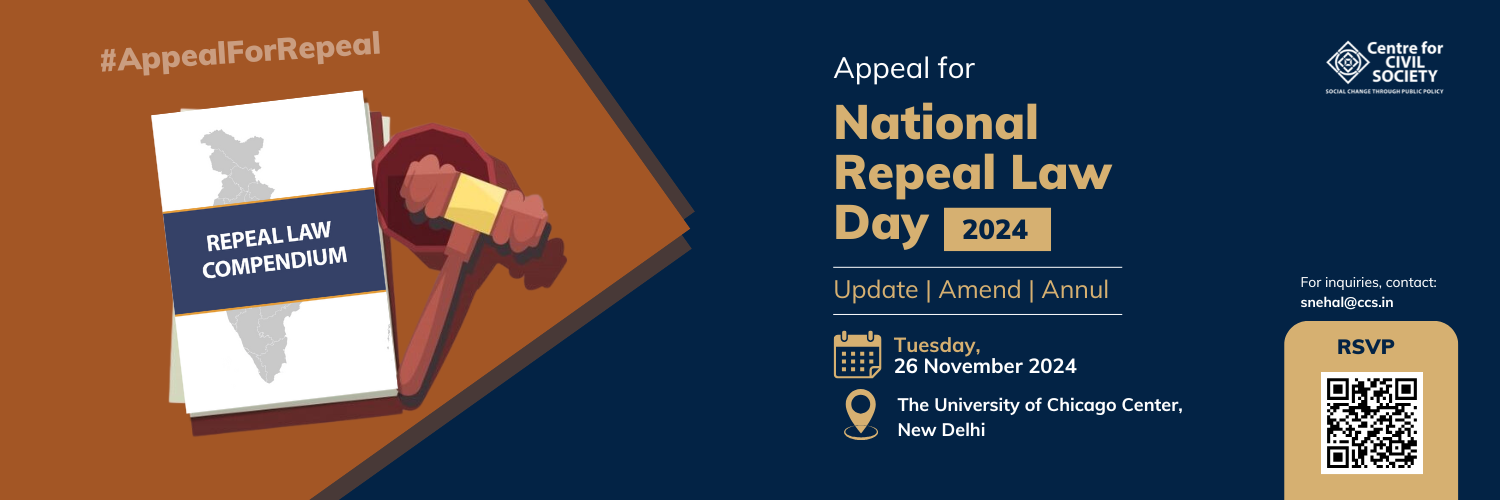The Rule of Lawforms the very foundation of a modern democratic society, defining the functionality of its public administration as well as the behavior of the private agents that constitute it. The effective codification of such a rule of law, requires as its prerequisites, to be precise in enshrining the intrinsic attributes of the democracy it serves and ensuring that this is done in the simplest manner possible.
As one of the largest democracies in the world with an ever-rising population, India’s enthusiasm for legislation has had, as a by- product, several statutes that with the advent of time have become obsolete, redundant or repetitive. In addition to this, there is the matter of inconsistent language and dissemination- making it di cult for an ordinary citizen to access and comprehend the plethora of legal information with ease.
This increased transaction cost coupled with glaring redundancy further breeds fertile grounds for corruption, discouraging engagement of individuals and firms with the society/ economy at large. Distorting the competitive dynamics of the economy, it leaves only those producers in the market who have surplus capital to bear costs of compliance. This, in effect, weakens the social fabric by incentivizing behavior such as corruption and cheating.
Faced with such unsettling possibilities, it is imperative that a strong movement is reckoned with the sole objective of reforming the legal structure of the country through the framing of sound laws and construction of State capacity to enable accountable enforcement.
To accomplish such a feat would require a ground- up hygiene check of existing laws, and the subsequent repealing of outdated laws, wherever necessary. This cleansing would yield a substantial impact in the functioning of the country- both in terms of a well- oiled economy as well as a stronger societal presence.
About Repeal of Laws Initiative
Centre of Civil Society (CCS) initiated the ‘Repeal of 100 Laws’ Project in 2014 with the aim to identify laws that could be repealed on account of three reasons—i) redundancy, ii) obsolescence in the face of new laws, and iii) hindrance to development, governance and freedom.
The success of ‘Repeal of 100 Laws’ Project, conducted in partnership with National Institute of Public Finance and Policy (NIPFP) and Vidhi Centre for Legal Policy, was reflected in the successful repeal of 23 Central laws (of a total 100 suggestions) through the Repealing and Amending Bill, 2014. Further, the project was acknowledged in a Report on ‘Obsolete Laws: Warranting Immediate Repeal’ released by the Law Commission of India in September 2014. For the next phase of the project, CCS reached out to the State Governments of Delhi and Maharashtra, with the Maharashtra Chief Minister agreeing to repeal 19 of 25 laws.
In the subsequent phases of the Repeal of Laws Project, CCS reached out to 13 State Governments, to carry out extensive studies, in collaboration with esteemed law universities from each state. In 2017-18, compendia for the states of Maharashtra, Uttar Pradesh, Chhattisgarh, Karnataka, and Telangana were published. In 2018-19, compendia had special focus on the states of Arunachal Pradesh, Assam, Sikkim, Manipur, Meghalaya, Mizoram, Tripura and Nagaland.
Appeal for National Repeal Law Day 2024
Centre for Civil Society, in an effort to institutionalize the repealing of laws as a constitutional practice for the Republic of India, would like to bring together like-minded organizations, scholars, academicians and lawyers to acknowledge 26 November as the National Repeal Law Day. The objectives of the National Repeal Law Day are:
- To celebrate the diversity of our legal system, take stock of repealing processes and have a constructive dialogue around the process of repealing of laws
- To build a conversation around the necessity of the sunset clause in the Indian legislative process.
The target is to bring together 50-70 dedicated individuals under one roof and to engage in constructive dialogue around the potential processes required for the institutionalization of repeal of laws. This event will have a panel discussion with legal experts, academicians and scholars that will help understand the nuances and details. The idea is to deliberate over the existing structures and processes for repealing laws in India, and envisaging practices which can be adopted moving forward.
